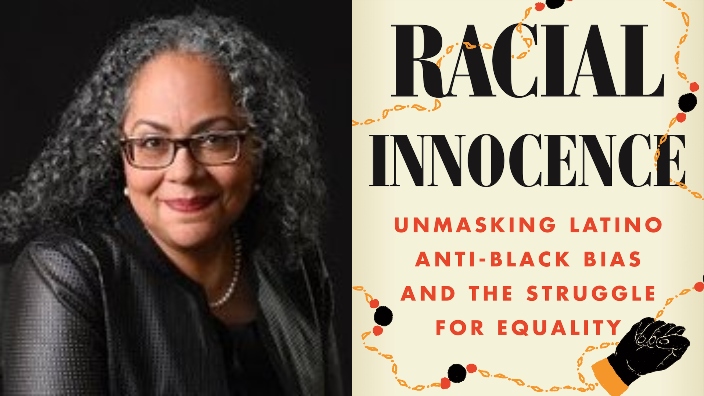Let’s talk about that Erica Mena apology
OPINION: Reality TV star Erica Mena apologized for calling her Black "Love & Hip Hop: Atlanta" castmate Spice a “monkey,” but does Mena truly understand the impact of anti-Blackness on Black children?

Editor’s note: The following article is an op-ed, and the views expressed are the author’s own. Read more opinions on theGrio.
Erica Mena says she’s sorry.
When news hit that reality TV personality Erica Mena called fellow “Love & Hip Hop: Atlanta” castmate Spice a “blue monkey” and made monkey sounds during an argument, the internet backlash was so loud that Mena got fired from not just one, but two jobs. Now she is apologizing for her choice of words.
“I deeply regret my insensitive comment and want to humbly apologize to anybody I hurt or offended by my thoughtlessness. My choice of words was wrong, and I take full responsibility for what I said,” Mena told TMZ in a statement, in the wake of the firing.
“As a woman of color and the mother of two Black children, I want to make it clear that my use of that word was not in any way racially driven. That said, I do understand the gravity of what I said and want to use my platform to promote inclusivity and equality.”
Mena’s apology has a PR polish and ChatGPT-esque quality to it that doesn’t sound like the Erica we know from TV, the same Erica who, on her very first “Love & Hip Hop” franchise appearance, began a fight with fellow video vixen Kimbella less than three minutes after meeting her.
But what truly stands out in Mena’s apology is the predictable mention of her Black children, a defense intended to purify her “monkey” insult as malicious but certainly not racist.
For Mena, family ties make her innocent of racial animus. But a willingness to bring Black children into the world doesn’t inoculate parents from the poison of anti-Blackness.
The “monkey” slur has a long and well-known history of racist connotation and it seems to be the insult of choice in multiple instances of Latino anti-Blackness in recent years. Onetime president of the Los Angeles City Council Nury Martinez had to resign last October after calling a colleague’s Black son a monkey in Spanish — a “choice of words” she said was about frustration and not race, of course. In 2015, Univision fired host Rodner Figueroa after he said the former first lady Michelle Obama looked like a cast member of “The Planet of the Apes.” Figueroa said his choice of words was simply misunderstood, and he wasn’t racist as he came from a “multiracial Hispanic family.”
These instances share a common theme, best encapsulated by scholar and author Tanya K. Hernandez, who calls this phenomenon “the racial innocence cloak.” Not only do some people of color say they never mean their insults with racist intent, but many of them try to excuse themselves by saying they too are Afro-descendent, so how could they?
The excuse is so common, that it has primed even some Black people to sympathize, such as the online commenters who have come to Erica Mena’s defense, insisting that her calling a dark-skinned Black woman a primate was only trading a low blow for a low blow since Spice talked about Mena’s child. Since some Black folks have been guilty of using harsh taunts like “monkey” themselves, the word suddenly loses its racially fueled baggage.
But it’s time to end excuses for using racist insults. Not only did the trans-Atlantic slave traders make stops in the continental U.S., they stopped in Latin America and the Caribbean, bringing even more kidnapped Africans to Antillean shores than they did to the USA.
The same anti-Black social hierarchy that exists in the U.S., exists in its own form in Latin America, albeit with language-specific racial terminology and nation-specific legal practices that enforced Black oppression. This history touches every single aspect of society and culture, no matter how racially mixed these populations may be.
And so when Mena — a Dominican-Puerto Rican woman who grew up in Newburgh, New York, and not abroad — uses the word “monkey,” the troublesome context is clear.
What’s most troubling is that Mena, as the mother of Black children, was willing to take the risk of even appearing racist by letting the insult come out of her mouth.
The romantic pairing of Latina women — usually mixed race and lighter skinned — with Black men of any ethnicity — African American, Afro-Latino, West Indian or otherwise — is quite common in communities across America. Historically, these ethnic groups have shared many parallel experiences — from migrating North to urban centers during the Great Migration to politically organizing alongside each other for civil rights, from the Black Panther Party to the Young Lords. In entertainment, we’ve seen couples with similar pairings: from J. Lo and Diddy to Offset and Cardi B to Stevie J and Joseline.
In a country where Latinos of all races and hues often live, work and socialize with Black people from many backgrounds, it is no surprise that some cross color and/or cultural lines, fall in love and bring children into the world. We can be allies in the best (or worst) times.
I know this personally because I am the product of this exact multicultural pairing — my mother is a racially ambiguous Puerto Rican woman and my father is a dark-skinned African-American man.
But with having children comes a responsibility, and with Black children, an extra responsibility to love and affirm their Blackness and Blackness in general.
We, the Black daughters of mixed-race or “mestiza” Latinas and Black men, grow up in a fascinating predicament. From the moment we come into the world, we receive conflicting and problematic messages about what it means to be Black or Latina (as if they were mutually exclusive). But no matter the confusion, we learn a racial and color hierarchy puts “Black people” on the bottom — depending on our own aesthetics and phenotype, we will learn to defiantly love our Blackness, or tragically try to distance ourselves from it.
We watch as society idolizes a “Latina” aesthetic of light skin and wavy hair that our mothers have but we may or may not fit. Some family members may make insulting comments or “jokes” about our hair texture (“pelo malo” or “bad hair”), even as they lovingly brush our tresses. Or we listen as a favorite tio or abuelo expresses dislike for Black people but tells us that it doesn’t apply to us — no, we are different — because we are family, not like those Blacks.
The racial antagonism can be so personal, so “intimate” as Professor Hernandez calls it, that it is, at times, hard to reconcile — even worse, hard to admit without shame or a sense of betraying your own.
Even within Latino families, where blood may be shared but color lines are blurred, there are stories of painful racism against darker-skinned family members. In the classic book, “Down These Mean Streets,” Puerto Rican author Piri Thomas writes of pleading with his lighter-skinned brother to acknowledge that he is Black and their experiences differ. The confrontation leads to an all-out brawl.
Here, in this intersection, blood is not always thicker than color.
Colorism is not exclusive to Latinos — many ethnic groups, including African Americans, face it. But it is destructive and must be eliminated at the root to stop its spread.
In my forthcoming book, “American Negra,” I write about what it was like to grow up at the racial and ethnic intersection of Blackness and Latinidad. I also interviewed many Black women who were born to mixed-race Latina mothers and Black fathers, and they fell into three camps:
The first were women who had Latina mothers who affirmed their Blackness in numerous ways. They were told that they were beautiful, and their mothers celebrated their heritage and history. Their mothers acknowledged racism and also called it out, protecting their children. Their mothers didn’t shy away from their own Blackness or ancestry when they had it.
The second were women whose Latina mothers were “racially innocent” in the way that Professor Hernandez documented. They didn’t actively disparage their daughters’ Black features or heritage, but they may have downplayed racial issues, turning a blind eye to problematic family members’ comments or leaving their daughters uneducated and unprepared for a racialized world.
And the third group of women had mothers who did actively harm their daughters. They told their daughters that their noses or lips were too big or that they should stay out of the sun so their skin didn’t get darker. They encouraged their daughters to marry lighter or whiter men so their children would be “beautiful.” With just the power of words, they made their daughters wish they were something else — anything other than Black.
In one particularly painful interview, a Puerto Rican woman whose father was African American said that her complicated relationship with her mother came from resentment. Her mother likely hated the Black in her and remarked on it at every turn.
The common reality was that these Black daughters were listening, watching, absorbing all the ways that the world — and particularly their mothers — treated and talked about Black people, to get cues about their own worth.
Erica Mena may not have meant to cause pain to her children with her comments. But beyond reckoning with lost jobs and public backlash, she may also need to reckon with sending a new message to her own beloved Black children — her daughter in particular — about colorism and what Blackness is.
Because love — especially a mother’s love — should do no harm.

Natasha S. Alford is VP of Digital Content and a Senior Correspondent at theGrio. An award-winning journalist, filmmaker, and TV personality, Alford is author of the forthcoming book “American Negra.” (Harper Collins) Follow her on Twitter and Instagram at @natashasalford.
TheGrio is FREE on your TV via Apple TV, Amazon Fire, Roku and Android TV. Also, please download theGrio mobile apps today!




